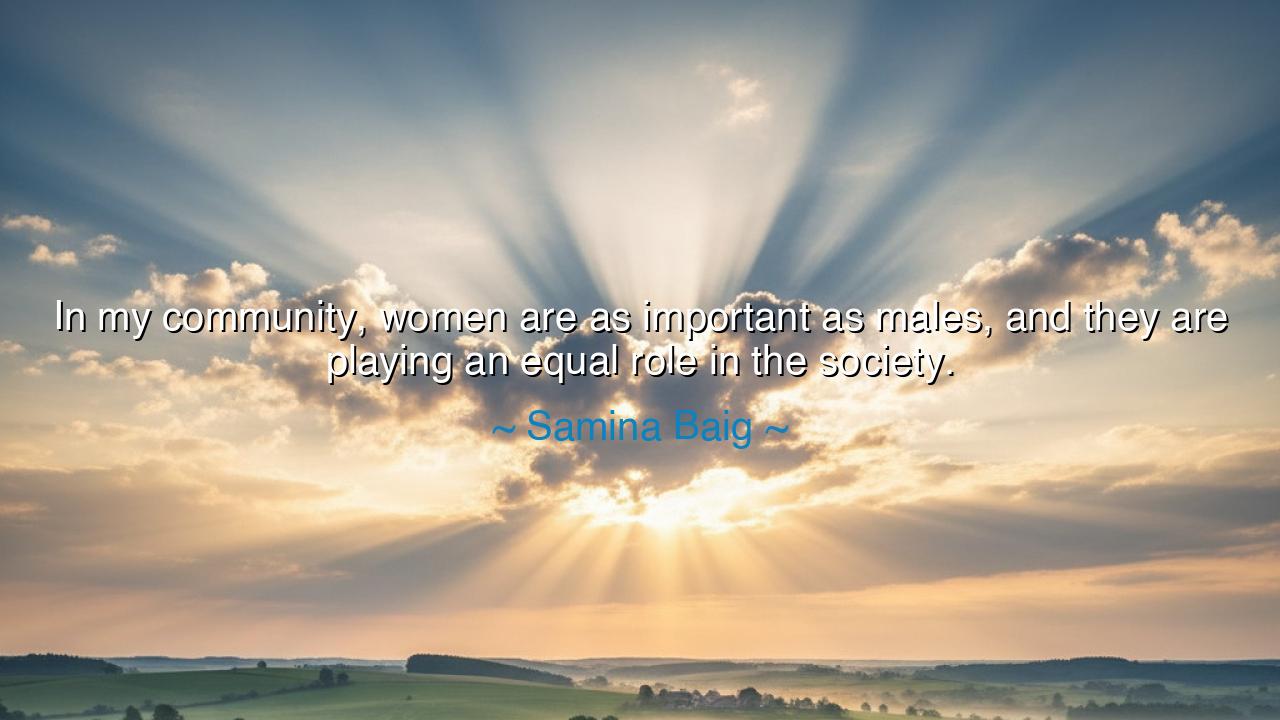
In my community, women are as important as males, and they are
In my community, women are as important as males, and they are playing an equal role in the society.






The words of Samina Baig, “In my community, women are as important as males, and they are playing an equal role in the society,” shine with the light of both affirmation and defiance. Spoken by the first Pakistani woman to summit Mount Everest, these words are not mere commentary, but the declaration of a pioneer whose very life became a testament to the strength of women. In them is the voice of a daughter of the Hunza Valley, a place where tradition and resilience are interwoven, where mountains rise like guardians of the sky. Samina’s proclamation is both personal truth and universal calling: that no society can flourish when half its strength—its women—is diminished or silenced.
The origin of this statement lies not only in Samina’s climb, but in the history of her people. The Hunza community, tucked away in the northern peaks of Pakistan, has long fostered a culture where women, though often burdened by tradition, held strong roles in farming, family, and community life. From this soil, Samina rose, challenging expectations even further by daring to step onto the highest summit on earth. Her achievement was not only her own; it became a banner for her community and her country, proclaiming that when women rise, the whole people rise with them.
History bears witness to this truth. In Sparta, unlike much of the ancient world, women were given education and physical training, for the Spartans knew that strong mothers bore strong sons. In the Soviet Union during the Second World War, women not only worked in fields and factories but also fought as snipers and pilots, proving their valor equal to any man. And in countless indigenous communities across the world, women have been revered as guardians of wisdom, keepers of land, and voices of counsel. Each of these examples confirms Samina Baig’s wisdom: when women stand equal, society becomes whole.
But her words also carry challenge. For too many societies still deny women this equal role. Too often, women are barred from education, silenced in politics, restricted in work, or measured only by the walls of the household. The world that refuses the full flowering of women’s potential cripples itself, walking on one leg where it might run on two. Samina’s victory on Everest is not only symbolic; it is a living rebuke to the chains that remain. She stood on the highest point of earth to show that no summit is barred to a woman, and that no community should call itself complete while half its voice is stilled.
The meaning of her words, then, is not confined to Hunza or to Everest, but reaches across all lands and peoples. A society that honors both men and women equally reflects the balance of creation itself. For just as day needs night and the earth needs sky, so too does a community need the wisdom of both its daughters and its sons. Equality is not indulgence; it is necessity. It is the harmony that allows a people to thrive in justice, in creativity, and in strength.
The lesson for us is clear: wherever you stand, you must ensure that women’s voices are heard, honored, and elevated. In families, listen to daughters as much as to sons. In schools, give the same opportunity to the girl as to the boy. In workplaces, grant equal pay for equal work. And in the halls of governance, let women shape the destiny of the nation alongside men. These are not luxuries, but duties, if we would claim to live in a just society.
Practical actions can be taken by all. Mentor young women in education and profession. Speak out against customs or laws that silence or diminish them. Support communities and organizations that lift women into leadership and honor their contributions. And above all, teach your children—both male and female—that equality is not a gift given by men to women, but a birthright woven into the fabric of humanity.
Thus let Samina Baig’s words be remembered as both testimony and command: women are as important as males, and they are playing an equal role in society. To deny this truth is to live in weakness; to embrace it is to live in strength. And when all communities rise to this wisdom, then humanity itself will stand taller, able at last to climb not only the mountains of earth, but the greater summits of justice, harmony, and peace.






AAdministratorAdministrator
Welcome, honored guests. Please leave a comment, we will respond soon